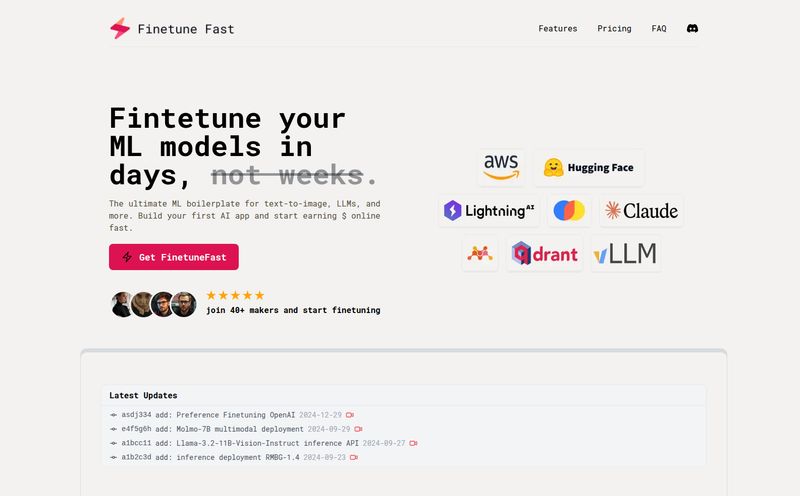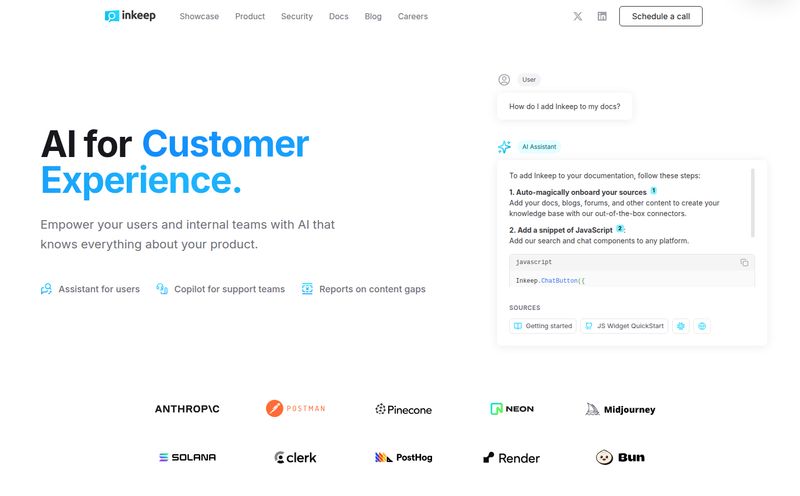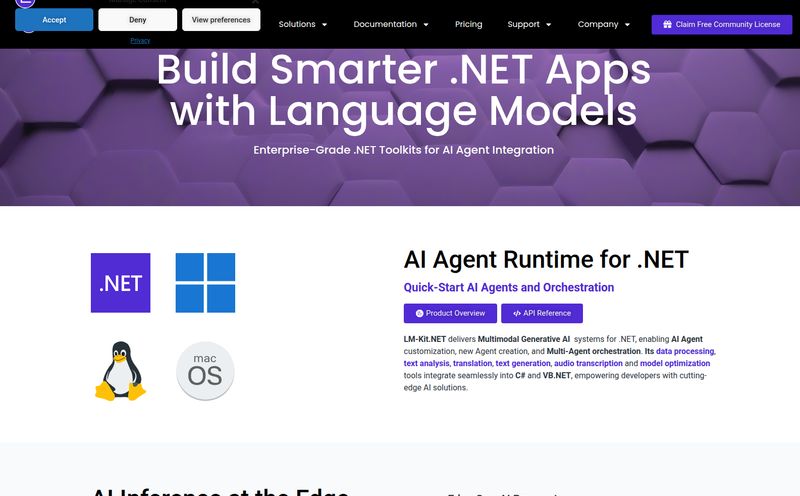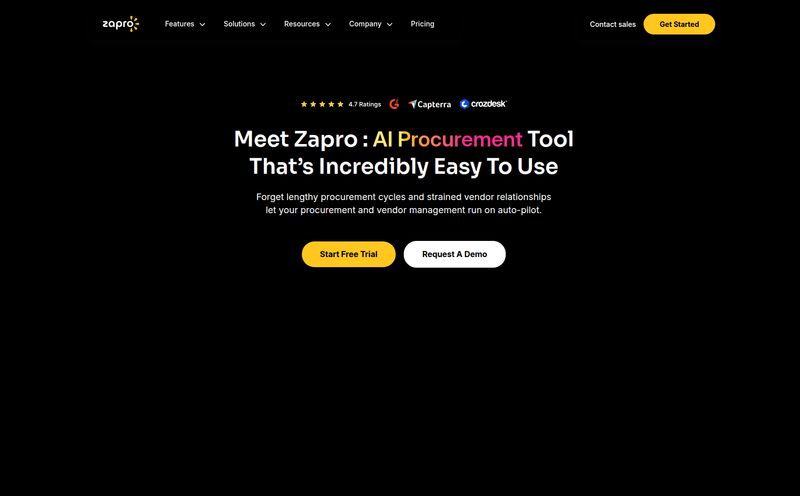As an SEO and traffic guy, I’ve seen more “revolutionary” AI tools in the last two years than I’ve had hot dinners. Every other week, there’s a new platform promising to change the world, automate everything, and probably make your morning coffee. Most of them are just fancy wrappers on top of the same large language models (LLMs) we're all familiar with. They're useful, sure, but revolutionary? Not always.
But then a platform like Alomana comes across my desk, and I have to admit, my curiosity piques. They’re not just talking about a single, all-knowing AI. They’re talking about building a team of AI agents. Think of it less like hiring a brilliant but distractible intern (your typical LLM) and more like hiring a full department of specialists: a data analyst, a marketer, a banker, a coder. Each one an expert in its field.
It's a different philosophy, one that moves from general intelligence to specialized, efficient action. And frankly, it's a direction I think the industry desperately needs to go. So, is Alomana just more marketing fluff, or is this the start of a real shift towards what they call “The Autonomous Enterprise?” Let’s take a look.
So What is Alomana, Really? Beyond the Buzzwords
At its core, Alomana is a multi-AI agent platform designed for businesses. Their big idea is to let you “Build your company AI block by block.” Instead of throwing a massive, expensive LLM at every single problem, you deploy smaller, specialized AI agents that work together. One agent might be an expert at sifting through financial reports, another at drafting marketing copy, and a third at analyzing customer data.
These agents can work alone or as a team to automate complex workflows. Imagine your marketing agent identifies a trend, then signals your data analyst agent to pull the relevant numbers, who then passes a report to the content agent to draft a blog post. That's the vision here—an interconnected ecosystem of AI specialists running your company on, as they put it, “autopilot.” It’s an ambitious claim, but the logic behind it is sound.
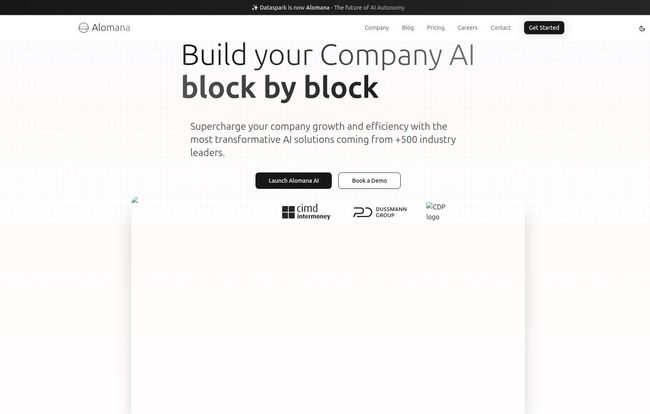
Visit Alomana
The Alomana Difference: Agents vs. Just Another LLM Wrapper
Here’s the part that really got my attention. Alomana makes a bold statement right on their homepage:
"Outperform LLMs and cut AI costs up to 7x."
In a world where AI compute costs can spiral out of control, a 7x reduction is a massive deal. How do they supposedly pull this off? It comes back to the specialist vs. generalist argument. A huge model like GPT-4 is incredible, but using it to do a simple data classification task is like using a sledgehammer to crack a nut. It's overkill, and it’s expensive.
Alomana’s specialized agents are smaller, more focused, and therefore more efficient and cheaper to run for their specific tasks. By combining these agents, you get high performance on complex workflows without the astronomical cost of running a single, giant model for everything. They call this Hybrid AI Technology, and it’s a smart way to get the best of both worlds. You get the power you need, where you need it, without the waste.
A Look Under the Hood at Alomana's Features
So, what tools do they actually give you to build this AI-powered future? It’s more than just a concept; they have some tangible features that are clearly built with business needs in mind.
Building Your AI Workforce
The main draw is the ability to create Custom AI Agents and group them into AI Agent Teams. This isn't just about chatbot-style conversations. It's about building automations that can handle multi-step processes across your company. For instance, you could build an HR agent team to handle the initial screening of candidates, schedule interviews, and even conduct preliminary Q&As. The potential to streamline departmental workflows is pretty obvious.
Integration and Security
For any of this to matter in a real business environment, it has to play nice with the tools you already use. Alomana promises Seamless Integration with your existing tech stack, which is crucial. An AI tool that lives in a silo is a novelty; one that connects to your CRM, your database, and your analytics software is a genuine asset. On top of that, they emphasize Enterprise-Grade Security, which is non-negotiable when you’re dealing with sensitive company data. They seem to understand that trust is the foundation for any serious AI adoption.
Meet the Team: A Few of Alomana's Ready-Made Agents
To give you a better idea of what these agents do, Alomana showcases a few pre-built specialists with some pretty eye-popping performance metrics. I’ve always been skeptical of vendor-supplied stats, but these are specific enough to be interesting.
| AI Agent | Industry | Claimed Metric |
|---|---|---|
| AI Banker | Finance | 99.8% accuracy in investment solutions and fraud detection. |
| AI Marketing | Marketing | +45% increase in automation, 89% time saved. |
| AI Data Analyst | Insurance/Data | 70% cost reduction based on real-time analysis. |
| AI HR Analyst | HR | 5x more efficient management of HR-related operations. |
Now, we have to take these with a grain of salt, of course. But numbers like a 5x efficiency gain in HR or 99.8% accuracy in banking tasks are hard to ignore. It shows that these agents are trained on specific, high-stakes business functions.
Let's Talk Money: The Alomana Pricing Plans
Okay, this is where the rubber meets the road for most businesses. Revolutionary tech is great, but what's it going to cost me? Alomana has a surprisingly accessible entry point.
Their first tier, the AI Multi-Agent Chat, starts at $0 and then goes to $20 per user, per month. This is a brilliant move. It lets smaller teams or curious departments get their hands dirty, build custom knowledge agents, and see the value for themselves without a massive upfront investment. This plan includes the ability to outperform standard LLMs and access to advanced data security. It's a very compelling offer for dipping your toes in the water.
The second tier is The Autonomous Enterprise. As you might guess from the name, this is the full-fat, all-inclusive package for larger organizations. The pricing is “Contact Sales,” which is standard for enterprise-level software. This plan unlocks everything: launching full AI applications, access to their entire library of pre-built agents, building custom automations and workflows, API access, and 24/7 priority support. This is for companies ready to go all-in on AI automation.
The Other Side of the Coin: Any Potential Downsides?
No tool is perfect, and it’s important to be clear-eyed. While the vision is impressive, there are a few things to consider. First, the documentation suggests that building truly custom agents and complex workflows might require some technical expertise. This isn't necessarily a plug-and-play solution for a total beginner who wants to automate a highly specific, proprietary process. You might need someone on your team who understands APIs and system logic to get the absolute most out of it.
Secondly, while the enterprise pricing isn't public, you can assume it will be a significant investment, as it should be for that level of service. Finally, relying heavily on any AI platform introduces new kinds of operational risks. You have to manage it properly, monitor performance, and have backup plans. This is true for any powerful system, not just Alomana.
My Final Take: Is Alomana Worth the Hype?
After digging through their site and analyzing their approach, I'm genuinely optimistic. Alomana feels different. They're not just selling AI; they're selling a more logical, efficient, and scalable way to implement it. The move away from do-it-all generalist models toward specialized agent teams just makes sense from a business and cost perspective.
I think Alomana is perfect for tech-savvy startups and established enterprises that are tired of experimenting with basic AI chatbots and are ready to tackle real, core business automation. The low entry-point pricing for the multi-agent chat makes it almost a no-brainer to at least try out.
It's probably not the right fit for a solo entrepreneur with zero technical skills looking for a simple social media scheduler. But for any company with a bit of a technical bench and a real desire to improve efficiency, Alomana could be a game-changer. It's one of the first platforms I've seen that presents a truly credible roadmap from simple AI chat to a fully autonomous enterprise.
The Bottom Line
The AI space is noisy and crowded. It's easy to become cynical. But Alomana’s focus on specialized agents, cost efficiency, and enterprise-grade integration makes it stand out. It feels less like a product of the current hype cycle and more like a tool built for the next phase of AI adoption, where results and ROI matter more than just clever demos. It’s definitely a platform I'll be keeping a close eye on.
Frequently Asked Questions about Alomana
- What is the main difference between Alomana and a standard LLM like ChatGPT?
- The biggest difference is the approach. Instead of one large, general-purpose model, Alomana uses a team of smaller, specialized AI agents. This makes it more efficient and cost-effective for specific business tasks like data analysis, finance, or HR, rather than general conversation.
- Is Alomana suitable for small businesses?
- Yes, it can be. Their "AI Multi-Agent Chat" plan starts at $0, making it very accessible for small businesses or individual teams to start building knowledge agents and explore the platform's capabilities without a large financial commitment.
- How secure is the Alomana platform?
- Alomana emphasizes its enterprise-grade security and compliance. This is a core part of their offering, as they are built to handle sensitive business data and integrate into corporate environments where security is a top priority.
- Do I need to be a developer to use Alomana?
- Not necessarily for the basic features. You can likely use their pre-built agents and chat functions easily. However, to unlock the platform's full potential by building highly custom agents and complex automated workflows, some technical or development knowledge would be very beneficial.
- What kind of integrations does Alomana support?
- While their site doesn't list every specific integration, they state a commitment to "seamless integration" with your existing tech stack. The enterprise plan includes REST API access, which allows for custom connections to a wide variety of software like CRMs, databases, and other business tools.
- How does Alomana help reduce AI costs?
- Alomana claims to cut AI costs by up to 7x by using smaller, specialized AI agents instead of a single, massive LLM for every task. These agents are more efficient and require less computational power for their specific functions, leading to significant savings, especially at scale.
